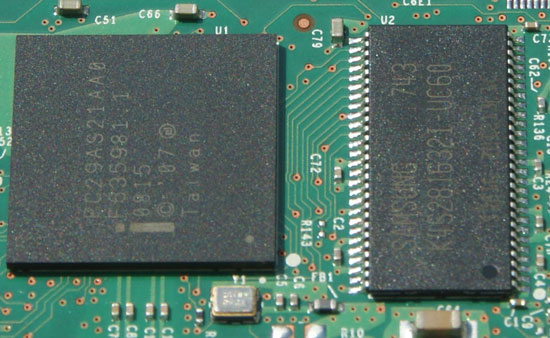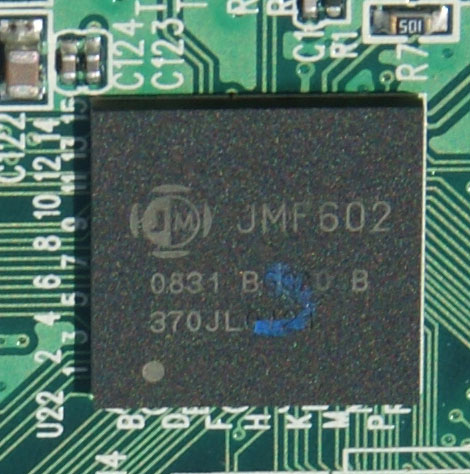Intel X25-M SSD: Intel Delivers One of the World's Fastest Drives
by Anand Lal Shimpi on September 8, 2008 4:00 PM EST- Posted in
- Storage
A Lack of DRAM or a Lack of Cache?
The high latency random write issue is annoying enough that it'd force me not to recommend any of the non-Intel MLC drives on the market today, regardless of how attractive their pricing may be. High performance with caveats isn't exactly high performance to me.

Intel's controller (left) + DRAM (right)
That being said, the root of the problem is still unknown. My first thought was that it was because the MLC drives had no DRAM buffer, and if you'll notice, Intel's MLC drive does have a DRAM buffer. I asked Intel about this and it turns out that the DRAM on the Intel drive isn't used for user data because of the risk of data loss, instead it is used as memory by the Intel SATA/flash controller for deciding exactly where to write data (I'm assuming for the wear leveling/reliability algorithms). Despite the presence of the external DRAM, both the Intel controller and the JMicron rely on internal buffers to cache accesses to the SSD.

Finding good data on the JMicron JMF602 controller is nearly impossible, but from what I've heard it's got 16KB of on-chip memory for read/write requests. By comparison, Intel's controller has a 256KB SRAM on-die. And I'm going to go out on a limb and assume that given Intel's experience with CPU caches, that its SRAM implementation is probably very well done.
With the JMicron based solutions, if you try and write too much to the drive (and trust me, it won’t take a lot) and the buffers get full, the controller tells the system that it’s not ready to write more data and you get a pause.
When you cause the JM602’s internal buffer to overflow, your system runs in bullet-time. Applications take much longer to launch and close, windows take longer to appear, and there are distinct pauses in anything you want to do that involves the disk. Want to send an IM? Well, that writes to an IM log - you can expect a pause before you can send your IM. Loading webpages is the worst, reading from and writing to the cache wreaks havoc on these cacheless MLC drives. Just for kicks I tried loading AnandTech while I was extracting a 5GB file on the SuperTalent 60GB MLC, it took over 10 seconds for the website to load. Once the JM602 was free to fulfill the read request, the website just popped up - but until then it was like my DNS was failing. It’s a lot like what happens to your notebook if you try and do too much, the disk quickly becomes a bottleneck.
Thankfully, as we've already seen, this problem is only limited to JMF602 based MLC drives. The SLC drives and the Intel MLC are totally fine, so while I'll include these problematic MLC drives in today's comparison, let me state now that I would not purchase one.
JMicron's roadmap shows a new controller next year with an integrated ARM core as well as support for external DRAM, which could alleviate these problems, but until now the controller, and drives based on it, aren't worth it. You get a much better overall experience out of a conventional mechanical disk drive, and much better performance from the Intel SSD or any of the SLC solutions on the market.
The Test
| CPU: | Intel Core 2 Quad Q9450 (2.66GHz) |
| Motherboard: | Intel DG45ID |
| Chipset: | Intel G45 |
| Chipset Drivers: | Intel 8.1.1.1010 (Intel) |
| Memory: | Corsair XMS2-8500 1066 |
| Video Card: | VisionTek Radeon HD 4850 |
| OS: | Windows Vista Ultimate 32-bit |










96 Comments
View All Comments
mindless1 - Thursday, September 11, 2008 - link
Sometimes the cure is worse than the problem.Gannon - Tuesday, September 9, 2008 - link
Don't worry derek I still heart you guys! :PHere's some cool software to check out (they have free trial version)
http://www.whitesmoke.com/landing_flash/free_hotfo...">http://www.whitesmoke.com/landing_flash...otforwor...
Maybe it will help escape complaints from the grammar nazi's, I think a lot of grammar is BS anyway. Language evolves constantly. It's a flexible tool to communicate.
Nihility - Monday, September 8, 2008 - link
An excellent review. The benchmark results were always confusing in the past. No one would try to explain why an SSD with seemingly superior specs can't outperform a 7200 drive in media test. Thanks for putting the time in to resolve this issue.As for buying a drive like that, the price is still too steep for me to consider and you definitely made it clear that buying a jmicro SSD is out of the question.
As for further testing, I'm very interested in seeing how a good SSD performs as an external drive over USB. The robustness and sturdiness of the drive is very important for something you lug around. We all know how bad bandwidth is over USB but I wonder how the latency will fair.
Keep up the good work.
kmmatney - Monday, September 8, 2008 - link
One of the other reviews I read said this SSD's controller will learn hard drive usage patterns, and get faster over time. Any tests of this feature?leexgx - Monday, September 8, 2008 - link
not sure how thay can lerni did wunder why thay never put any DRAM buffer on SSD drives as i was expecting SSD to suffer badly from lack of buffer any MLC drives basicly suck (16kb buffer per flash chip) unless its the intel MLC drive lol or an SLC drive seem mostly ok, but an intel SLC going to rock when thay get tested
Anand Lal Shimpi - Monday, September 8, 2008 - link
The Intel drive will learn hard drive usage patterns however it does so over an extremely long period of time, not something I could develop a test for in my time with the drive.Take care,
Anand
whatthehey - Monday, September 8, 2008 - link
...that doesn't think too much about HDD performance, particularly when we're talking about insane prices. Sure, rebooting and reloading all of your apps will feel much faster. Personally, when I reboot I walk into the kitchen or bathroom, walk back a few minutes later, and I don't notice the delays. Not to mention, I only reboot about once a month (usually when nVidia releases a new driver that I need to install).Another major problem I have is the tests as an indication of the "real world". Take the whole antivirus thing. I hate AV software and software firewalls, which is why I don't use Norton, AVG, Avast, McAfee or any other product that kills performance, sucks up memory, and only prevents virii/trojans after an update. AV software is just a BS excuse to pay a $60/year subscription and get nags every time your subscription expires. So there's on "real" scenario I don't ever encounter.
Archive extraction can be pretty disk intensive as well, but how often do you need to extract a 5GB archive? Okay, so let's say you're a pirate and you do that daily... great. Now you can extract faster, but you have an SSD that can only hold 14 or so large archives. It's a nice illustration of SSDs being faster, but it's completely impractical. I have a 1TB drive just for all the movies, images, music, and disc images I have floating around.
The tests show that SSDs can help a lot, but I for one use capacity far more. Between several games, my standard apps, and Vista I think I would use most of the 80GB. Then I think of the price and I could grab a couple VelociRaptors or even four 1TB Samsung F1 drives. I'll be truly impressed when I can get at least 320GB of SSD for less than $200. Actually, it's more like I want a good SSD with a reasonable capacity for under $100. Until then I'll just stick with my slower drives and avoid worst-case situations where HDD performance is a problem as much as possible.
The article was good, and I appreciate the info on the MLC issues with JMicron. That confirms my suspicion that inexpensive flash drives are worse than standard mechanical drives. Intel has addressed the problem, but price is now back to where we were last year it seems. I guess the real problem is that I'm just not enough of an "enthusiast" to spend this much money on 80GB of storage... not counting stuff like that old 4GB hard drive back in the day that set me back over $200. Give it a few more cycles and I think I'll be ready for SSDs.
PS - Also, who cares about $600 CPUs when you can buy $200 CPUs and overclock to higher performance levels? I don't think we'll ever see overclocked SSDs or HDDs.
DerekWilson - Tuesday, September 9, 2008 - link
i wouldn't be so sure about not seeing overclocked SSD ...as this article points out, intel puts a focus on reliability ... but to do so they do sacrifice performance. the voltage applied to the transistors to store data is calibrated to write the cells quickly while maintaining a good life span. a higher voltage could be applied that would allow the cells to be written faster but would reduce the number of writes that a cell could handle.
if intel says 100gb a day for 5 years ... i don't need that by a long shot. i would be very willing to sacrifice a lot of that for more speed.
i actually spoke with intel about the possibility of overclocking their ssd drives at idf -- it is something that could be done as it is controlled via the firmware of the drive. if intel doesn't convolute their firmware too much or if they allow enthusiasts to have the necessary control over settings at that level we could very well see overclocked SSDs ...
which would be very interesting indeed.
shabby - Monday, September 8, 2008 - link
I was so close in buying one of those ocz drives, in fact the reason i didnt buy it was because it was a special order that took 2 weeks.Excellent write up, especially about the jmicron/mlc "glitch".
OCedHrt - Monday, September 8, 2008 - link
Any reason why the WD GP drive does so well in the multitasking test? Even better than the VelociRaptor?